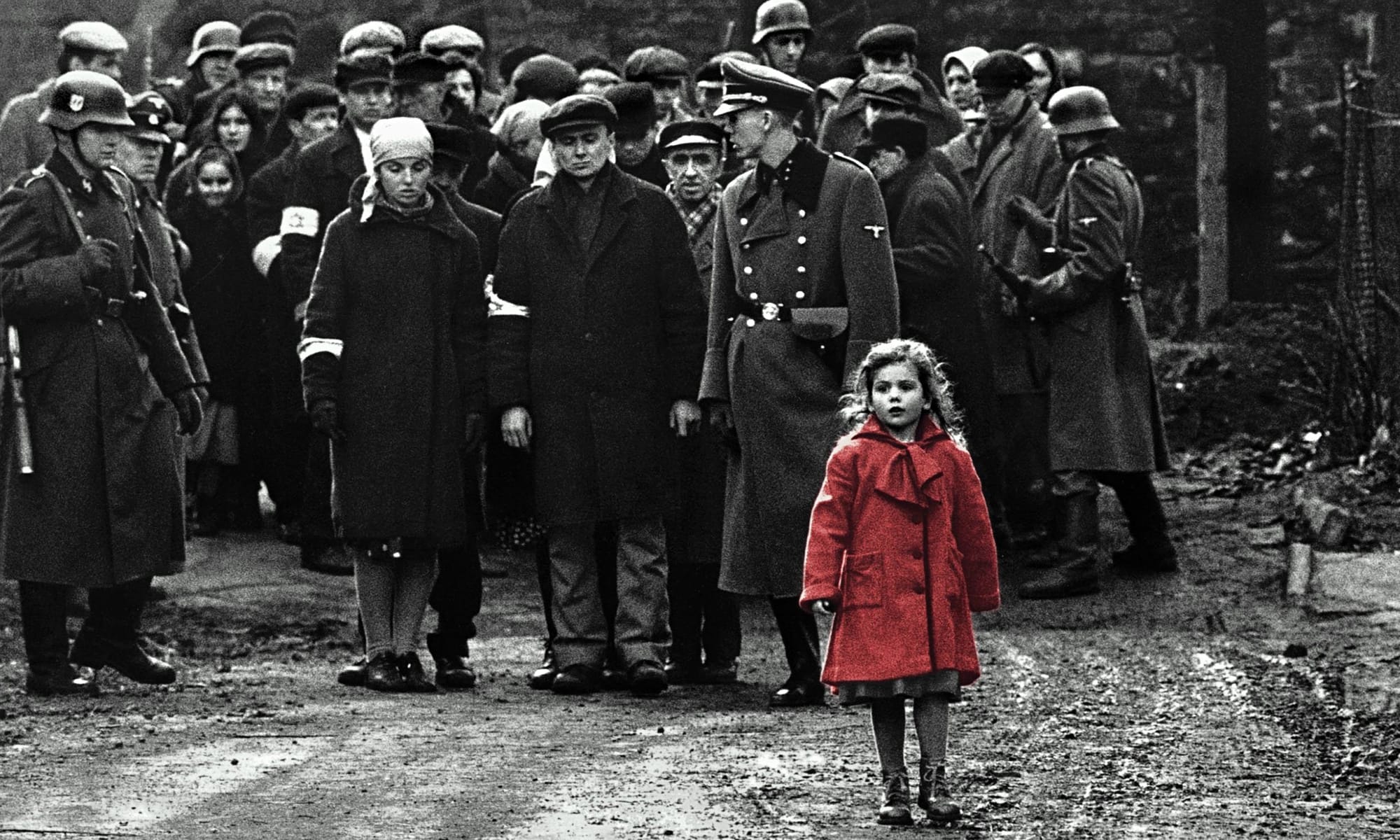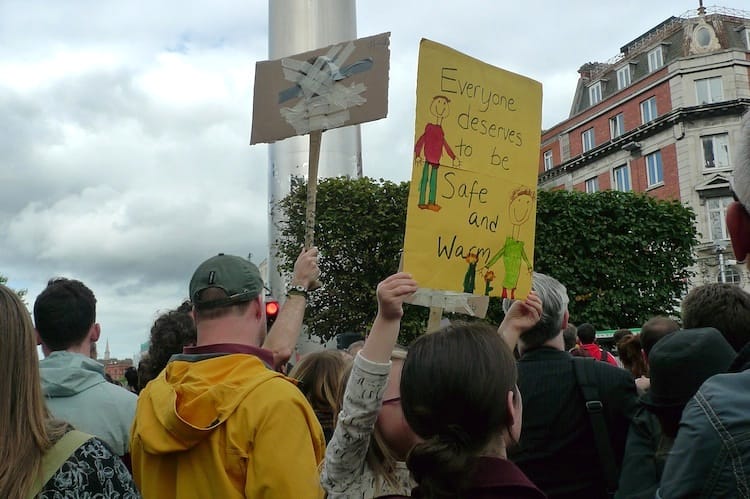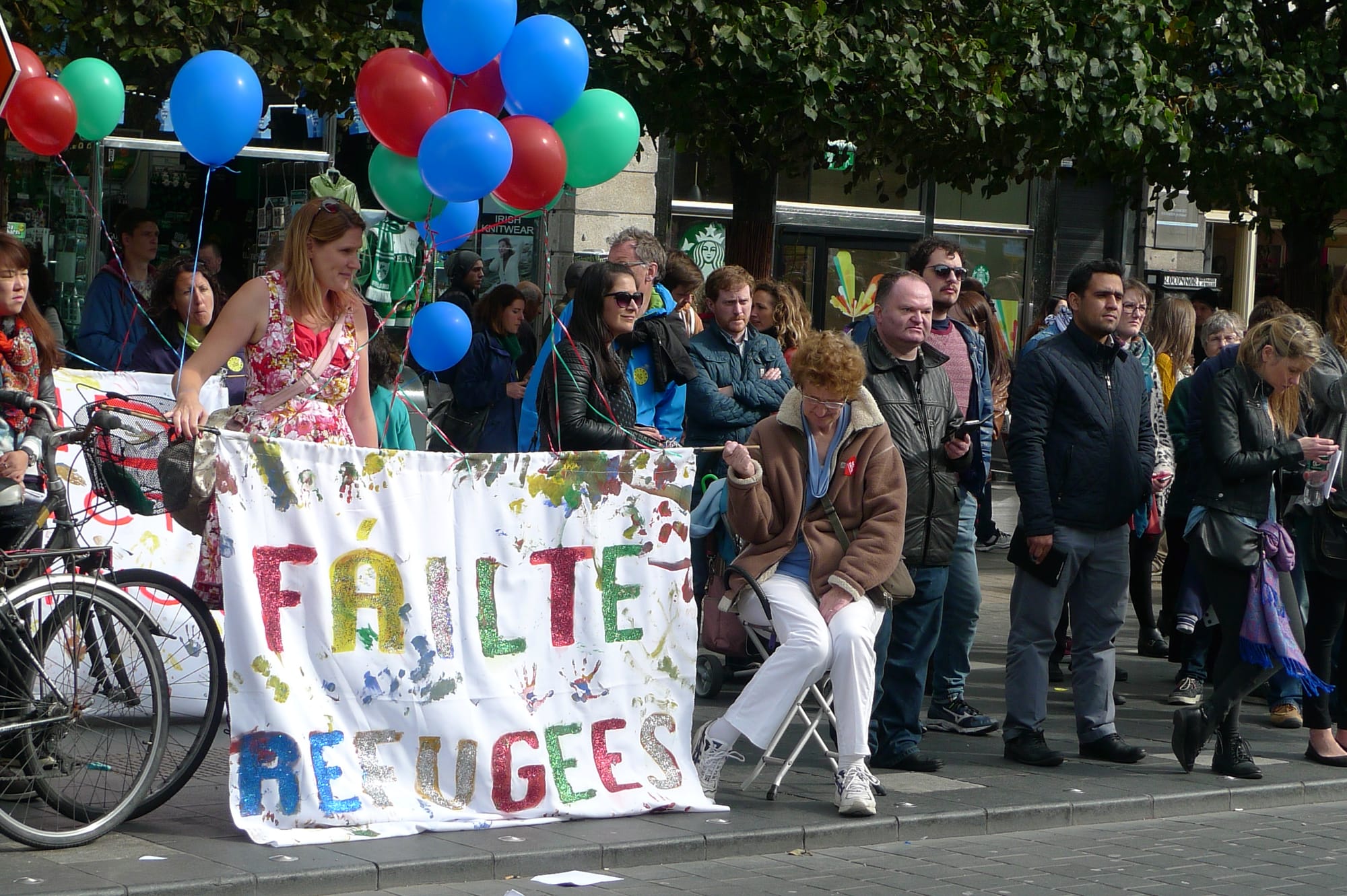What would become of the Civic Offices on Wood Quay if the council relocates?
After The Currency reported the idea of the council moving its HQ, councillors were talking about and thinking through the pros and cons and implications.
Pat Muldowney doesn’t consider himself an activist. But accidentally helping to feed hundreds of desperate refugees on a Greek holiday island opened his eyes to the crisis.

Last Saturday at about 1.45 pm, Pat Muldowney said, “I suppose we should head in,” and got up to leave his two dogs in his red-brick home off South Circular Road and head into town to the show of solidarity for refugees by the Spire.
Muldowney is a stained-glass artist who designed many of the interiors and murals for the Little Caesar’s restaurant chain and windows for churches across the country. He is also an accidental activist who in late August called Joe Duffy from the Greek island of Leros because he had to tell Ireland what he had seen.
That month, he had gone to Leros for a summer break and to see whether he owed property taxes and to settle the bill.
He first visited the island in 1997. He had found that the light and colours helped his work and he bought a house and had it for fourteen years and sold it, he says, and he tried to wean himself away and explore the rest of the world but kept finding himself back there, a home away from home.
This year, along with other Aegean islands, Leros has been faced with growing numbers of refugees floating over from Turkey on inflatable boats, fleeing the destruction in Afghanistan, and Pakistan, and Syria, and Iraq.
Before we head in to town, he recalls one of the images that he remembers from his holiday, of refugees being marched in a group as the police blew a whistle, and he caught one man’s eyes and the man was terrified. In the group, there was a black girl who seemed to move into focus.

“I immediately saw that image from Schindler’s List where the Gestapo were rounding up the Jews from the buildings and there’s the little girl in the red coat and the whole scene is in black and white. And I just saw that same image with the black girl, and I immediately saw that. I kept seeing images from that scene while I was there,” he says.
He is wearing a dark blue hoodie and jeans and brown leather shoes, and he picks up a dark blue blazer from the kitchen table as we leave. We close the front door and as it shuts, Muldowney says that more people have started to donate and to head to the island to help: “Well, I wasn’t really into Facebook, but I have to say, it works, geez, it works.”
He walks fast past the rows of houses and he shakes his head and says, in a way that seems like he’s talking to himself: “So, I don’t know how it’s all going to end, you know. I really don’t.”
On Clanbrassil Street, Muldowney says that he’d never given too much thought to the history of the neighbourhood until he’d returned from Leros. But lately, he’s thought more about Ireland’s record of taking in refugees and how, during the Second World War, official Ireland was indifferent to victims of the Holocaust.
“My house has all Jewish markings on the doors,” he said. “When I bought that house, I found all these ledgers and they went back to 1894 and it was for the Jewish Hospital Fund. It gave a list of all the streets, almost every house was Jewish. They all contributed a penny towards the Jewish Hospital.” He gave them to the Irish Jewish Museum.
When he came back to Ireland and heard that, at first, the country would take in 550 refugees, he was upset. “I thought it was history repeating itself,” he said. He was happy when the figure rose to 4,000.
* **
Muldowney doesn’t consider himself an activist. He’s taken up conservation causes sometimes, and abhors cruelty to animals so his dogs always come from the pound. But that was about it.
The activism for refugees started for Muldowney with a birthday on Leros, he told me earlier on Saturday at the table in his spacious kitchen.
His friend Julie Peakman, a writer and author of a recently published book about the famous Irish whore Peg Plunkett, who also had a house on Leros, had invited him to her party. “I’ve known her for years,” said Muldowney.
At the party, Peakman was on the phone a lot, said Muldowney. He asked her what was going on and she asked him if he’d help with the work she was doing with refugees, and Muldowney said yes, and was tasked alongside two American ladies with making cheese sandwiches and taking them down to the port police in Lakki.
There, he saw as many as a thousand people in the police compound where they are processed, sleeping on the ground on cardboard boxes and trying to shelter from the hot sun. He found Peakman and they gave out sandwiches and then fistfuls of biscuits and juice in plastic cups.
He had 200 sandwiches. There were hundreds more people. They just had to hand them out and when they came to the end, say, “I’m sorry, we’ve no more,” and their faces just dropped, said Muldowney.
That first day, there were Iraqis and Iranians and Palestinians and Kurds and the families were mostly Syrians. “And they were just starving and thirsty, and that went on the whole morning it just flew like that,” he said. The volunteers were mainly tourists, he said, and he wondered why the big aid agencies weren’t there.
“What struck me was the amount of people who didn’t have shoes,” he said. So they just went through the donated shoes to try to find sizes that would fit them. He would measure his size-44 feet up against people, to try to work out their size, and people began to call him 44.
One of the American women he was staying with gave him a pair of leather tennis shoes and he took them down, and a man came over and said “44”. Muldowney looked down at his feet; they were big. “I said, there’s no way you’re 44,” he recalled.
He watched. “Well. He squeezed his feet into them and 20 guys around all in a circle praying that they wouldn’t fit, so they could have them. But he got them on and he wasn’t taking them off.”
When he handed out sandwiches on the second day, a man came towards him and held out his hand for a sandwich, and then a second sandwich. An interpreter told him there was only one each. The man led them around to where his wife and two children and elderly parents were sat, too exhausted to queue.
“So I broke down at that stage,” says Muldowney. He clears his throat and gives a deep sigh and takes a large gulp of tea, as if to pull his mind back from that moment to the familiarity of the here and the now.
When one group of sea-soaked, hungry refugees arrived, they had to turn to discarded supplies.
“And we started breaking up this awful cheese with our hands, with our backs to them so they couldn’t see us, and we stuff the cheese into the bread and handed it out to them. And it was cheese that we didn’t think you would use, you know what I mean, but they were so hungry and they just thanked us,” he said.
He lists the indignities that he saw: restaurants charging refugees to charge their phones; travel agents charging refugees for tickets to get on a free ferry; hotels that refused to take refugees whether they have money or not; and hundreds of people who hadn’t eaten for two or three days locked in a building overnight – they went and fed them bread and water through the gates.
On the day he broke down, he went to the beach in the afternoon and he tried to read a book but he couldn’t. He tried to listen to some music but he couldn’t switch off, and he just started crying and said to himself that people need to know what’s going on. “This is like Second World War stuff,” he said.
“I was going to contact the Irish Times, and then I thought, no, I’ll just send Joe Duffy an email because I know most ordinary people listen to that,” he said. Duffy had him on the next day, for about 15 minutes.
“It got a huge reaction, apparently, and people from all over Ireland starting contacting them and people started donating money,” he said.
Since he’s been back in Ireland, he continues to channel funds to the Leros Solidarity Network led on Leros by Martina Katsiveli, a Greek magistrate, to help them cover their daily costs for food and water and clothes.
He fields phone calls, and takes donations and makes sure they reach the volunteers on Leros, who use them to buy clothes and food for those who continue to arrive.

By the Spire, Muldowney stands on the edge of the crowd and picks up a yellow “Refugees Welcome” sticker from a passing woman and sticks it on his blue blazer.
The turnout isn’t great, he says. He pauses and reconsiders: “It’s a start, a start.”
It’s a strain to hear the speakers over the hum of buses and cars as they rumble up O’Connell Street. The crowd claps. There are cardboard signs stuck to the tops of hurleys. A girl and a guy chat about who’s turned up and who hasn’t.
“I wasn’t sure whether I’d see any of yez, like, because you’ve all put in your years,” the girl says.
“John doesn’t come in to many, he would come in for the water charges but I’m not sure he’d come in to this one,” the guy says.
She says John is probably at Tayto Park.

“I think John loves it more than the kids, you know,” he says.
It starts to rain and for a few minutes some umbrellas go up before the rain eases again. It seems to Muldowney as if there are too many politicians on the stage.
“Humanity, it’s humanity, it’s compassion,” he said. “The Church . . . I’m not saying the Church, I don’t want the Catholic Church . . . but there should be . . . Diarmuid Martin should be here . . . It shouldn’t be political,” he says.
“It shouldn’t be political,” he says. “I didn’t come here to listen to them.”
After a few more minutes, he says that he’s heading home.
The day after we met, he sent me another text to say that he’s heard that three more people have drowned, and ten more people are missing, while making their way to Leros.